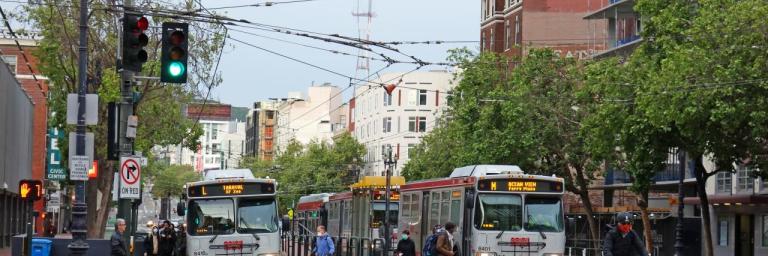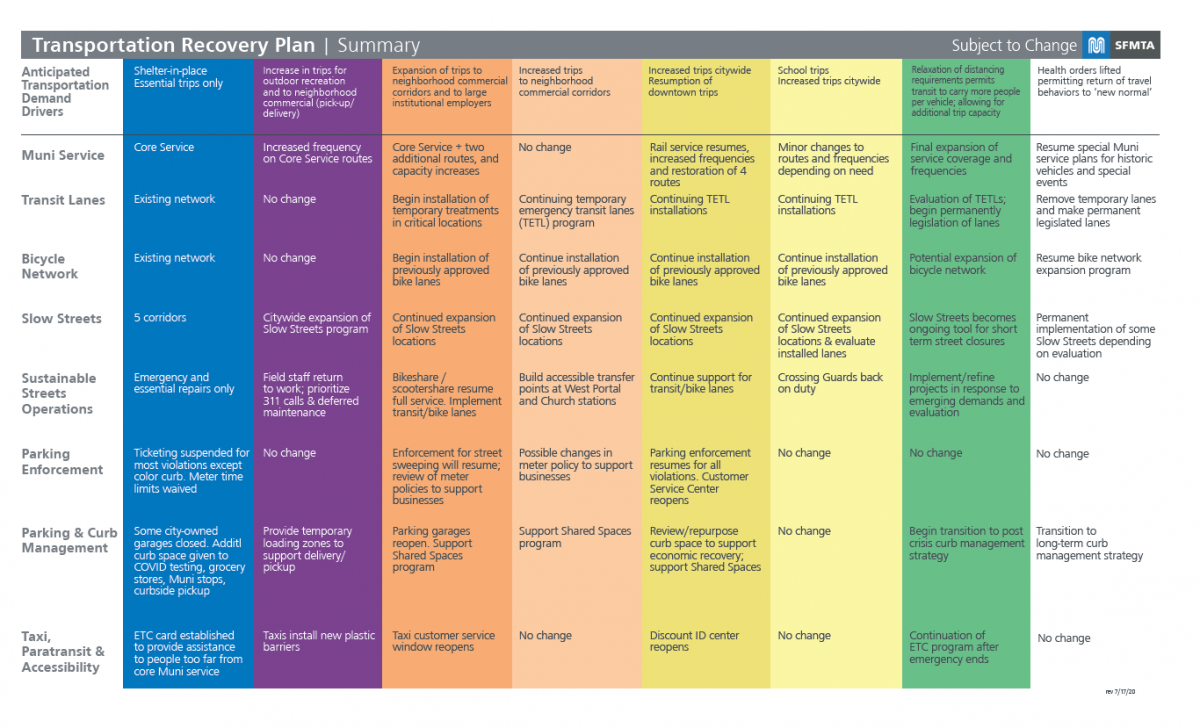The SFMTA Transportation Recovery Plan (TRP) is guided by the city's evolving public health orders and recommendations from the San Francisco Department of Public Health, and its levels respond to incremental increases of community and economic activity. The plan includes meeting transportation needs driven by the health crisis. A thoughtful and equitable plan allows us to better serve our customers and help support the city and region's economic recovery.
The TRP is our framework for expanding our transportation services and operations as the Public Health Orders are modified and demand for travel increases.
The TRP:
- Aligns with advice of San Francisco Department of Public Health experts.
- Responds to changes in permitted activities and as economic activity ramps up.
- Adjusts to evolving health conditions, new transportation data and input from stakeholders.
- Addresses longstanding problems and helps us plan for longer term recovery efforts.
- Lays out the sequencing of how SFMTA will bring back transit service as well as street operations.
- Incorporates efficient modes of transportation through tools like bike lanes, Slow Streets, transit lanes, paratransit and taxis.
- Supports small businesses and communities through tools like street closures and curb management.
Our Recovery Values
The recovery will require difficult trade-offs and changes; as we confront these, the SFMTA will be guided by the following values:
- Prioritize the protection of the health and safety of SFMTA employees and the public as we recover
- Support a transportation system with infrastructure and services that drive economic activity and is the backbone of San Francisco’s social fabric
- Commit to equity, safety, customer service and addressing environmental sustainability, as informed by our Strategic Plan
(Accessible version of TRP Chart)
Muni’s Recovery
The TRP makes the best use of our limited resources to adapt Muni service to minimize risk to our employees and the public, meet changing health guidance and trip needs and support a strong economic recovery.
Core Service
Since April 8, 2020 Muni has been operating a COVID-19 Core Service Plan to respond to public health orders, including for cleaning and physical distancing, and a severe drop in overall ridership. The Core Service Plan keeps 90 percent of San Franciscans within one mile of a transit stop.
In the past year, SFMTA has added back modified routes to increase citywide connections and put more frequent service and larger buses on routes with crowding to provide more space onboard to physically distance from others, thereby minimizing risks to customers and operators.
Physical distancing means that Muni buses can only carry one-third of our usual passenger load from pre-COVID-19 levels. This means that it now takes about 3 buses to move the same number of people as one bus did back in January. 100% compliance with face coverings would enable greater Muni service and reduce the risk of transmission.
A Broader Increase of Muni Service
The SFMTA is being strategic as we increase Muni service. Decisions will continue to be based on:
- Data for ridership trends and where ridership is highest
- Equity efforts like the Muni Service Equity Strategy to prioritize transportation for those with the fewest options
- Feedback from operators, policymakers and the public
Protecting Muni Customers with Transit Lanes
As congestion returns, SFMTA is acting quickly to move more people with fewer resources. SFMTA’s temporary emergency transit lanes lanes allow buses to complete their routes in less time and turn around back into service more quickly, picking up customers more frequently to reduce crowding and provide more space on board to maintain distance.
Community input and data will be essential parts of evaluating any temporary transit lanes with a focus on health, safety and equity. Except when there is a public process to make a lane permanent, temporary lanes will automatically be removed 120 days after the emergency order is lifted.
Additional information can be found on the Temporary Emergency Transit Lanes webpage.
The Post COVID-19 Transportation System
The COVID-19 pandemic has changed our transportation system; the crisis’s impact will be felt far beyond the end of the shelter-in-place order. With limited resources, the SFMTA’s number one goal for its TRP is to protect the health and safety of SFMTA employees and the public as we recover.
We’re in this together: If we all do our part, we’ll get back to normal on the fastest path possible.

